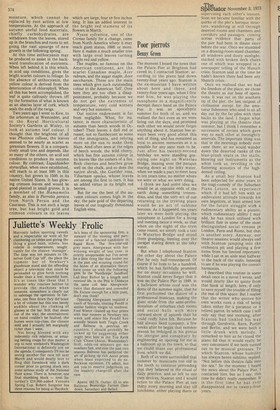Poor pierrots
Benny Green
The moment I heard the news that the Palace Pier at Brighton had caved in, I contacted Stanton, according to the plans laid down twenty-four years ago. Stanton is the ex-musician I have written about here and there, and twenty-four years ago, when I first met him, he was playing the saxophone in a magnificently decrepit dance band on the Palace Pier. It was an apocalyptic summer for both of us, end we realised the fact even as we were Hying out the days, and promised each other we would never forget anything about it. Stanton has always been very good about this sort of thing, and has remained as loyal to ancient memories as it is possible for any sane man to be. Just after his twenty-second birthday we . were standing gossiping one night on Waterloo Bridge, leaning over the parapet staring down at the inky water, when we made a pact to meet herein ten years time, no matter where we were or what we were doing.
I think we had some idea we would be at opposite ends of the earth doing something tremendous, and that the very act of our returning to the trysting place would be an act of sublime heroism. As it happened, ten years later we were both playing the saxophone in London for a living and meeting twice a week, so that when on the night of the tryst came round, we simply took a taxi to Waterloo Bridge and stood there gossiping, leaning over the parapet staring down at the inky water.
But when I telephoned Stanton the other day about the Palace Pier he only half-remembered. Of course if he lives to be a hundred, which he has faithfully promised me on many occasions he will, Stanton could never forget that it was on the Palace Pier in 1949, in a ballroom whose roof was the dome of the summer night, that he first performed the duties of a professional musician, making the giant stride from the semi-professionalism of suburban club rooms and social halls with more outward show of aplomb than he could really have felt. Because he hdd always liked company, a few weeks after he began that summer season he indulged in his genius for intrigue and conspiracy by engineering an opening for me in a ballroom up in the town, so that we could share our professional lives, which we did.
Both of us were surrounded that summer by musicians too old in the tooth to continue pretending that they believed in the ritual of daily practice, and so left to our own devices. Stanton and I would retire to the Palace Pier at ten thirty every morning and stay till lunchtime, either playing duets or supervising each other's lessons. Soon we became familiar with the
quirks of the pier's baroque structure, wandering at will through deserted rooms and chambers and corridors and passages, coming across evidence that parts of the pier had been in disuse since before the war. Once we stumbled on a drawing-room-sized chamber. all windows and dusty sunlight. stacked with broken deck chairs one of which was wrapped" in a newspaper telling of the Munich crisis. Stanton said at the time he hadn't known there had been any Munich crisis.
Once we realised that we had the freedom of the place, we chose the theatre as our base of operations. It was out on the southern tip of the pier, the last outpost of civilisation except for the amatueur fishermen who used to sit all day out by the far piles with their backs to the land. I forgot what was playing at the theatre that summer, but I think I remember a succession of revues which gave way to each other at fortnightly intervals. The important thing was that in the mornings nobody ever came there, so we would wander down the deserted ranks of the blue-plush seats in the stalls. blowing our instruments as the whim took us, revelling in the flattering acoustics of the highdomed ceiling.
As a small boy Stanton had been subjected for some years to the tragi-comedy of the Suburban Piano Lesson, an experience which, if it had left him with an ambivalent attitude towards his own begetters, at least armed him for the future struggle with a rudimentary ability as a pianist, which rudimentary ability I may add, he has since utilised with brilliant flair in some of the most distinguished social venues in London, Paris and Rome, but that is another story. Anyway, our theatre sessions would always end with Stanton jumping into the orchestra pit and playing a few items from his limited repertoire, while I sat in an aisle seat halfway to the back of the stalls, listening to see if he was playing the correct harmonies.
I described this routine in some detail once in a novel I wrote, and would dearly like to quote from that book at length, here, 'if only to save myself the trouble of filling the rest of this space. But I realise that the writer who quotes his own works runs a risk of being taken either for a paranoic or a retired parrot. In which case I will only say that one morning, after Stanton had tinkled his way through Gershwin, Kern, Porter and Berlin, and we were both a little drunk with melody. I remarked to him as he closed the piano lid that it would really be very convenient if we both turned out to be musical geniuses. To which Stanton, whose humility has always beeen sublime, replied. "Not before this theatre falls into the sea." So the moment I heard the news about the Palace Pier, I contacted him, but as I say, this time he didn't really remember. It is the first time he has ever disappointed me in twenty-four years.


































 Previous page
Previous page